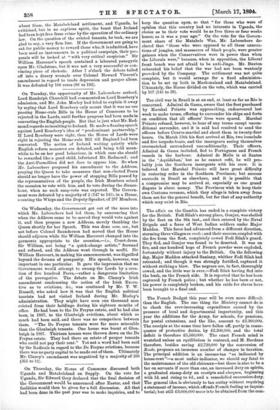On Wednesday, the Government got out of the mess into
which Mr. Labouchere had led them, by announcing that when the Address came to be moved they would vote against it, and then propose a new Address, merely thanking the Queen shortly for her Speech. This was done nem. con., but not before Colonel Saunderson had moved that the House should adjourn while Sir William Harcourt changed into the garments appropriate to the occasion,—i.e., Court-dress. Sir William, not being " a quick-change artiste," frowned and refused, and the Address went through in mufti. Sir William Harcourt, in making his announcement, was dignified beyond the dreams of pomposity. His speech, however, was important in one particular. It gave the impression that no Government would attempt to swamp the Lords by a crea- tion of five hundred Peers,—rather a dangerous limitation of the prerogative. The debate on Mr. Clancy's Irish amendment condemning the action of the Irish Execu- tive as to evictions, &c., was continued by Mr. T. W. Russell, who asked how it was that the English political tourists had not visited Ireland during Mr. Morley's administration. They might have seen one thousand men evicted from their holdings during his eighteen months of office. He had been to the De Freyne estate, and he had also been, in 1887, to the Glenbeigh evictions, about which so much had been said, and there was no comparison between them. " The De Freyne tenants were far more miserable than the Glenbeigh tenants. One house was burnt at Glen- beigh in 1887. Thirteen houses were thrown down on the De Freyne estate. They had there an estate of pauper tenants who could not pay their rent." Yet not a word had been said by the Radicals in regard to the De Freyne evictions, because there was no party capital to be made out of them. Ultimately Mr. Clancy's amendment was negatived by a majority of 339 (351 to 12).


































 Previous page
Previous page